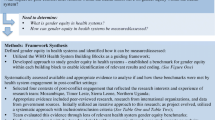
Overview
- Draws on public health, sociology, law, development, politics and social policy to discuss HIV and gender as a social justice problem in South Africa
- Conveys women’s narratives through direct quotes that elevate the voices of socially marginalised women living with HIV
- Highlights the potential of applied social health science research methods to make normative social justice commitments that advance health equity in societies
Part of the book series: Global Research in Gender, Sexuality and Health (GRGSH)
Access this book
Tax calculation will be finalised at checkout
Other ways to access
About this book
HIV in women, and possible responses, are investigated on four distinct levels: conceptual, social structure, health systems, and law. The analysis demonstrates that this problem is indeed modifiable with long-term interventions and an enhanced state response targeted at multiple levels. This book will be of interest to academics and students in the social health sciences, gender and development studies, and global health, as well as HIV/health activists, government officials, policy makers, HIV clinicians and health providers interested in HIV.
Similar content being viewed by others
Keywords
- gender studies
- health justice
- human rights
- social justice
- social science
- women in south africa
- health inequity
- South African health policy
- Global Governance
- Human Security
- Social health inequalities
- gender health inequalities
- structural health determinants
- AIDS and women
- qualitative research methods
- gender-transformative interventions
- intimate partner violence
- Global South studies
Table of contents (9 chapters)
-
Front Matter
-
HIV, Gender and Health in Black South African Women
-
Front Matter
-
-
Capabilities for Black South African Women: Gender as a Structural Health Determinant
-
Front Matter
-
-
Back Matter
Reviews
“Gender and HIV in South Africa is an ambitious and important book, written meticulously and with great empathy. … it presents an excellent overview for those who seek to understand Black women’s vulnerability to HIV, offering the kind of information and context (historical, political,
and legal) that is particularly useful for actors such as NGOs and policymakers working at the intersection of health and gender justice.” (Kathleen Rice, Gender & Development, Vol. 27 (3), 2019)“The study’s multi-method approach and the engagement with key questions, drawing on a diverse range of knowledge sources—including pairing of large, quantitative datasets with empirical and original qualitative research—are particular strengths of the book. … Sprague invites researchers to extend themselves, to draw on the richness of interdisciplinary and transdisciplinary dialogue in researching the complex landscape of HIV and gender.” (Tamara Shefer, The Lancet, Vol. 19 (2), February, 2019)
“This work is groundbreaking and urges the reader to reflect on the structural links between gender inequalities, HIV, health, and social justice. Readers cannot avoid re-thinking how they approach these issues. … This book should be read by everyone in the fields of justice, health equity, gender, and HIV. … it should be read by all health practitioners and policymakers because it challenges us to reflect on health care, women’s capabilities to realize health, and health equity.” (Samantha Willan, African Journal of AIDS Research, Vol. 17 (3),2018)
“Path breaking.” (Diane Cooper, Professor, School of Public Health, University of Western Cape, South Africa)
“Courtenay Sprague shines a bright light on the gritty daily interchanges between unequal sex, inaccessible health care and continuing social injustice. This book reveals the roots of these damaging interchanges by giving voice to South African women living with HIV, while detailing structural barriers they still face more than two decades after the end of apartheid. This is such a valuable book.” (Cynthia Enloe, author of The Big Push: Exposing and Challenging the Persistence of Patriarchy)
“A seminal work that demands we understand the structural connection between gender-based violence, the HIV epidemic and women’s right to access healthcare; it confirms that this socially constructed human rights violation is one that can and must be solved.” (Bonita Meyersfeld, Associate Professor of Law and Director of the Centre for Applied Legal Studies, University of the Witwatersrand, South Africa)
“Courtenay Sprague’s volume on women, HIV and gender justice in South Africa is global public health scholarship at its best. In clear and accessible language, it offers a rare synthesis of research from disciplines as varied as anthropology, psychology, political philosophy, policy analysis, epidemiology and the biological sciences…Her analysis includes questions of treatment access and the quality of health services, but it also looks further afield, providing a wide-ranging reflection on the many gendered social and structural determinants of health for HIV positive women. The result is a rich, critical and holistic assessment of the ways in which the capacity of women living with HIV to live full, free and healthy lives has been foreshortened by social and structural barriers.” (Christopher Colvin, Associate Professor and Head of Social & Behavioral Sciences, School of Public Health & Family Medicine, University of Cape Town, South Africa)
Authors and Affiliations
About the author
Bibliographic Information
Book Title: Gender and HIV in South Africa
Book Subtitle: Advancing Women’s Health and Capabilities
Authors: Courtenay Sprague
Series Title: Global Research in Gender, Sexuality and Health
DOI: https://doi.org/10.1057/978-1-137-55997-5
Publisher: Palgrave Macmillan London
eBook Packages: Social Sciences, Social Sciences (R0)
Copyright Information: The Editor(s) (if applicable) and The Author(s) 2018
Hardcover ISBN: 978-1-137-55996-8Published: 09 April 2018
Softcover ISBN: 978-1-349-71941-9Published: 13 November 2020
eBook ISBN: 978-1-137-55997-5Published: 16 March 2018
Series ISSN: 2523-7683
Series E-ISSN: 2523-7691
Edition Number: 1
Number of Pages: XXX, 404
Number of Illustrations: 10 b/w illustrations
Topics: Social Justice, Equality and Human Rights, Development and Health, Gender Studies, African Politics



